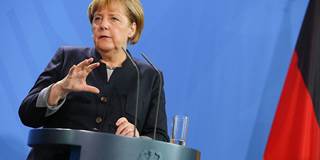Even if Angela Merkel remains Germany's chancellor after next year's federal election, she will be unable to exercise the same authority over Europe as she has since 2010. That will profoundly change how the EU works, and the disruption could have a profound effect on the European project's future.
PRINCETON – Next year, Germany will hold a federal election, and the new Bundestag will choose the country’s next chancellor. Whether or not Angela Merkel retains the role – at the moment, things are not looking good for her or her Christian Democratic Union (CDU) – one thing is certain: Germany’s chancellor will no longer be de facto Chancellor of Europe. That will profoundly change how Europe works – some of it for the better. But the disruption could be nasty.

PRINCETON – Next year, Germany will hold a federal election, and the new Bundestag will choose the country’s next chancellor. Whether or not Angela Merkel retains the role – at the moment, things are not looking good for her or her Christian Democratic Union (CDU) – one thing is certain: Germany’s chancellor will no longer be de facto Chancellor of Europe. That will profoundly change how Europe works – some of it for the better. But the disruption could be nasty.